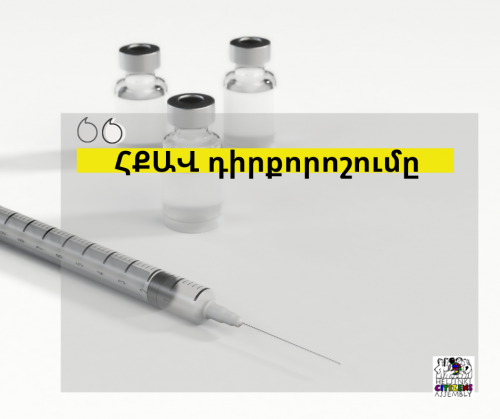




Covid-19 vaccination – aimed at prevention of the pandemic – should be carried out in line with the law and requirements of a democratic state

COVID-19 | Activities | Publications | News | Legislative Proposals | Legislative Proposals and Analysis
HCA Vanadzor attaches great importance to vaccination in the context of public health and overcoming the pandemic. At the same time, we record that RA Health Minister’s order N 65-Ն - which contains legal regulations of vaccination or PCR test - and the Draft Law on Making an amendment and addenda to the RA Law on Public Service are problematic in terms of a number of constitutional rights, principles of legal certainty and proportionality. Below we present substantiations of the above-mentioned statement.
The Order implies an indirect legal regulation on mandatory vaccination, whereas mechanisms of compensation for the damage to health are not clear in the event of possible negative consequences of the jab.
The European Court of Human Rights also expressed its position regarding this, noting that compensation available in case of damage caused to health is vital for overall assessment of the mandatory vaccination system.
Besides the necessity to introduce compensation mechanisms, the Parliamentary Assembly of the Council of Europe also notes that it is important that citizens be clearly informed that vaccination is not mandatory and that no-one can be subjected to pressure for not getting vaccinated.
The Minister’s order is also problematic in terms of the principle of legal certainty. Vaccination, just as any other medical intervention, implies interference with private life, which should be based on a free and informed consent. In this context, any interference with physical and mental integrity must be prescribed exclusively by law, which will allow for applying other mechanisms, including that of compensation.
By DCC-1592 of 4 May 2021, the RA Constitutional Court reaffirmed its legal position that “a fundamental right can be restricted only by law”.
However, in the context of assessing the RA legislative process back in 2014, OSCE ODIHR recorded that sublegislation -in this case, the Minister’s order - should be within limits of legislation and therefore should not contain additional obligations or additional restrictions of natural persons’ rights.
Thus, the Minister of Health did not have the authority to include in the legal act restrictions that can be established only by law. By this initiative, the Minister exercised the function of the legislative body, which is anti-constitutional.
Such restrictions cannot be imposed by the Minister’s order, let alone announcements.
In this context, the RA Prime Minister Nikol Pashinyan’s announcement made during the Government’s session is worrisome. The PM literally said, “There should not be a single unvaccinated person in the state government apparatus”.
This forced vaccination approach is completely incompatible with the proclaimed goals, such as the role of vaccination in public health and fight against the pandemic.
It should also be mentioned that it is not clear what consequences will be in case of not meeting the requirement of vaccination or PCR test every 14 days, because no other legal act enshrines the relevant consequences. Restrictions prescribed by the Օrder are not in line with domestic and international legislation, as well as human rights. Moreover, no evidence-based campaign is being conducted to raise awareness about efficiency of vaccination.
Besides, it is not clear on what grounds restrictions are imposed on the category of “employees”, because vaccination allegedly aims to protect public health, while the pandemic is surely not spreading only through employees.It is also noteworthy that this indirect compulsion to get vaccinated also implies exceptions for persons holding certain positions, which is a discriminatory approach. It is not clear what a certain position has to do with any anti-epidemic measure and state health policy.
Overall, it is not substantiated and reasoned how restrictions established in Armenia solve the public health issue.
The 14-day period for PCR tests is also incomprehensible, given that it is assumed that a person can be contagious on the first, second, third and all the successive days after the PCR test. Besides, it is also problematic that PCR tests should be carried out at the expense of the relevant person. This is problematic especially for employees who get the minimum salary or have low income, given that two PCR tests a month amount to a significant amount of their salary. It is important to record that fulfilling such requirements at the expense of one’s own salary is a restriction of the right to dispose of property, in this case, salary, at one's discretion. It should also be stressed that labor rights can only be restricted by law for the purpose of state and public security, protecting public order, health and morals or protecting the fundamental rights and freedoms, as well as honour and good reputation of others. Grounds for dismissal should also be prescribed by law.
Thus, though vaccination is vital in terms of public health and responding to the pandemic, the envisaged restrictions are not necessary and proportionate to the goal pursued, and are also problematic in the context of human rights.
Taking into account the vital role of the legal act in the public health sphere, it should have been at least put for public discussion, which was not done, either.
Based on these substantiations and the ones presented in the full recommendation, we recommend to
-
recognize invalid the RA Health Minister’s Order N 65-Ն of 20 August 2021;
-
withdraw the Draft Law on Making an Amendment and Addenda to the Law on Public Service;
-
establish regulations in line with the law.












Leave a Reply